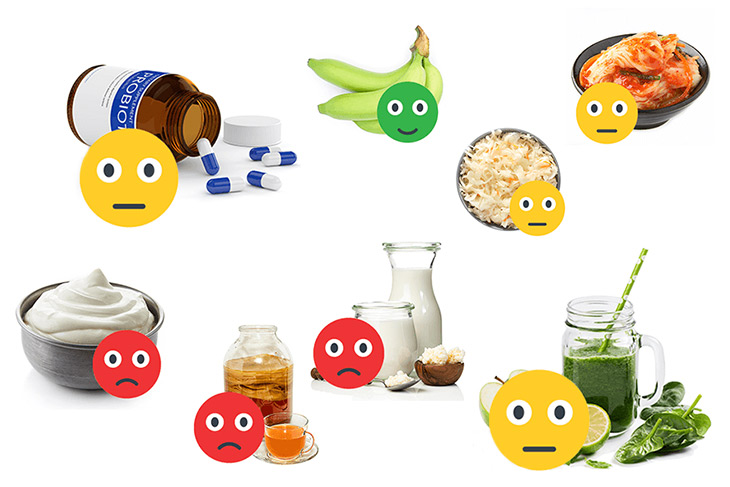Gut-friendly foods: fact or fiction?

Can kombucha, kefir or kimchi kick your gut conditions? We sort through the science and find that only one group of gut-supporting foods have scientific backing.
Our starting point is simple: Eating whole foods is always better than choosing a prepared or manufactured product. But let's see what each of these supposed gut-friendly foods can actually do for you.
Want to know more about the gut? Read our comprehensive guide to improving your gut health!
Probiotics - Mostly Fiction
The concept of probiotics is not new but it's certainly become very popular in recent years. Probiotics are usually sold as food supplements in capsule form.
In research, probiotics have proven beneficial for only a few health problems and is not an overall cure.
The positive effects of probiotics are usually strain-specific (as in, you need a specific bacterial strain for a specific stomach problem) and involve ingesting a much higher dose than is generally available in the supermarket.
Prebiotics - Fact
Confusingly, prebiotics are not the same as probiotics, but actually can help to balance your gut bacteria. Prebiotic fibres are best consumed in the form of whole foods, rather than supplements.
Where probiotics attempt to reintroduce good gut bacteria, prebiotics aim to feed the bacteria you already have and help them multiply and diversify.
Fermented foods - Mostly Fiction
Fermentation is an ages-old method for food preservation and the suggestion has been that the bacteria produced in this process supports your gut bacteria. Common fermented foods are sauerkraut, kimchi, yoghurt and kefir.
While more research is needed in this field, there is currently very little evidence that fermented foods are beneficial. However, fermented food like sauerkraut and kimchi are good for you in other ways, as they contain fibre (which IS good for your gut) and help diversify your diet. More on this below.
Fermented vegetables - Mostly Fiction
Fermented vegetables, like kimchi and sauerkraut, are created by adding lactic acid and other bacteria to food. While the fibre in these vegetables will support your gut health, the bacteria from the fermentation process will most likely not.
Yoghurt - Fiction
The probiotic bacteria Acidophilus and Bifidobacterium are the active substances in yoghurt said to provide gut health benefits. As with other probiotics, there is little evidence that this is effective for gut health.
At the same time, yoghurt overall is good for you. Sugar-free yoghurts contain protein, calcium, zinc and vitamins B12 and D and should be included in a healthy diet. Just don't rely on yoghurt to sort out your stomach issues.
Kombucha - Fiction
Kombucha can be made at home or bought practically everywhere these days as a prepared product. The health claims are plenty - mainly relying on the probiotics available in the drink.
There are several problems with kombucha. One is that there is no control of what a bottle contains - in fact, some contain no bacteria at all! Also, some of the bacteria present in kombucha doesn't survive the encounter with your stomach acid.
Finally, there is currently no evidence from good quality, well controlled human trials that kombucha provides any health benefit.
You should also note that homemade kombucha may not be safe for children and pregnant women as it may contain pathogenic bacteria, as well as small amounts of alcohol.
Kefir - Fiction
Kefir is another probiotic product that is not proven to improve gut health. It's delicious and, just like yoghurt, contains many other good things, but shouldn't be relied on to solve stomach problems.
Green smoothies - Mostly Fiction
The green smoothie is a tricky one. Obviously, a green smoothie can be made to contain many of the fibre-rich foods that support gut health, like oats and fruit, but the blending process damage these foods in ways that aren’t ideal.
Fibre-rich, gut health-promoting (i.e. prebiotic) foods are best consumed whole. By blending the food, you disrupt the food matrix, which can increase the speed at which the nutrients are absorbed into your bloodstream, amplifying metabolic hormonal responses and spiking sugar levels. It can also lessen the health benefits dietary fibre provides within the gut which defeats the purpose of having a green smoothie in the first place.
